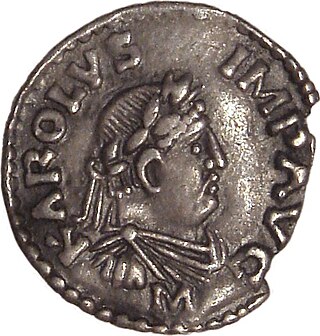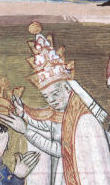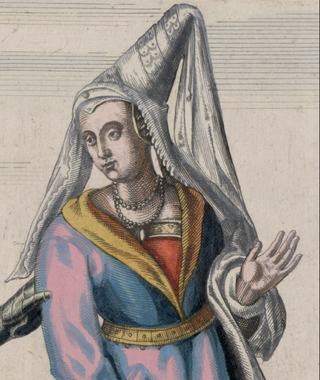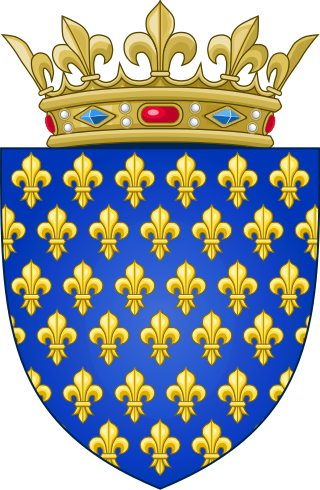
Charlemagne was King of the Franks from 768, King of the Lombards from 774, and Emperor from 800, all until his death. Charlemagne succeeded in uniting the majority of Western and Central Europe, and he was the first recognized emperor to rule Western Europe after the fall of the Western Roman Empire approximately three centuries earlier. Charlemagne's rule saw a program of political and societal changes that had a lasting impact on Europe in the Middle Ages.

Pope Adrian I was the bishop of Rome and ruler of the Papal States from 1 February 772 to his death. He was the son of Theodore, a Roman nobleman.

Offa was King of Mercia, a kingdom of Anglo-Saxon England, from 757 until his death. The son of Thingfrith and a descendant of Eowa, Offa came to the throne after a period of civil war following the assassination of Æthelbald. Offa defeated the other claimant, Beornred. In the early years of Offa's reign, it is likely that he consolidated his control of Midland peoples such as the Hwicce and the Magonsæte. Taking advantage of instability in the kingdom of Kent to establish himself as overlord, Offa also controlled Sussex by 771, though his authority did not remain unchallenged in either territory. In the 780s he extended Mercian Supremacy over most of southern England, allying with Beorhtric of Wessex, who married Offa's daughter Eadburh, and regained complete control of the southeast. He also became the overlord of East Anglia and had King Æthelberht II of East Anglia beheaded in 794, perhaps for rebelling against him.

Carloman I, also Karlmann, was king of the Franks from 768 until he died in 771. He was the second surviving son of Pepin the Short and Bertrada of Laon and was a younger brother of Charlemagne. His death allowed Charlemagne to take all of Francia and begin his expansion into other kingdoms.

Bertrada of Laon, also known as Bertrada the Younger or Bertha Broadfoot, was a Frankish queen. She was the wife of Pepin the Short and the mother of Charlemagne, Carloman and Gisela, plus five other children.

Ecgfrith was king of Mercia from 29 July to December 796. He was the son of Offa, one of the most powerful kings of Mercia, and Cynethryth, his wife. In 787, Ecgfrith was consecrated king, the first known consecration of an English king, probably arranged by Offa in imitation of the consecration of Charlemagne's sons by the pope in 781. Around 789, Offa seems to have intended that Ecgfrith marry the Frankish king Charlemagne's daughter Bertha, but Charlemagne was outraged by the request and the proposal never went forward.

Judith of Flanders was a Carolingian princess as the daughter of Charles II, Emperor of the Romans, who became Queen (consort) of Wessex by two successive marriages and later Margravine (consort) of Flanders.

Hildegard, was a Frankish queen consort who was the second wife of Charlemagne and mother of Louis the Pious. Little is known about her life because like all other women related to Charlemagne, she became notable only from a political background with records on her parentage, wedding, death and role as a mother.

The House of Capet ruled the Kingdom of France from 987 to 1328. It was the most senior line of the Capetian dynasty – itself a derivative dynasty from the Robertians.

Pepin the Short, was King of the Franks from 751 until his death in 768. He was the first Carolingian to become king.
Charibert, Count of Laon, was the maternal grandfather of Charlemagne. Charibert was the father of Charlemagne's mother, Bertrada of Laon.

The County of Blois was a feudal principality centred on Blois, south of Paris, France. It was created just after king Clovis I conquered Roman Gaul around AD 500. Between the 8th and the 13th centuries, it was amongst the most powerful vassal counties within the Kingdom of France, after having succeeded in surrounding the Capetian dynasty's lands of France since Blois annexed the Champagne.
The Count of Vermandois was the ruler of the county of Vermandois.
Waldo of Reichenau was an abbot and Carolingian official.
Odo I was the Count of Orléans following the final deposition of Matfrid until his own deposition a few years later.
Hunfrid was the Margrave of Istria and, according to some sources, Duke of Friuli from 799 to c. 804, when a Duke John was ruling Istria. He was the founder of the family called the Hunfridings.

Gerold was a franconian nobleman who served the Frankish King, Charlemagne, as Margrave of the Avar March and Prefect of Bavaria in what is now South-Eastern Germany. Gerold played a significant role in the integration of Bavaria into the Frankish Kingdom during Carolingian expansion in the late 8th, and early 9th centuries. Gerold both aided the continuity of Agilofing rule of Bavaria, as well as took steps to integrate Bavarians into the wider scope of the Frankish Kingdom. Gerold was related both to the Agilofing family, the ruling class of Bavaria, as well as the Carolingian family. The Agilofings had ruled Bavaria since Duke Garibald I in 548. Gerold was born into the Agilofings, and his sister Hildegard was married to Charlemagne in 771. From these familial connections, he was appointed Prefect of Bavaria following the deposition of Duke Tassilo III in 788. Gerold was heralded as a superb military commander, giving rise to his promotion to Prefect as a defender of the eastern border of the Frankish Kingdom. In 799, Gerold is said to have fallen in battle against the Avars, shortly after the same Avars killed his ally, Eric, Duke of Friuli, through treachery.
Adrian of Orléans was a Frankish count, son of Gerold of Vinzgau and Emma of Alemannia. His sister Hildegard of Vinzgouw married Charlemagne; therefore, he was the emperor's brother-in-law and uncle to the next emperor, Louis the Pious.
The Testament of Charlemagne was documented and witnessed in 811, the 43rd year of his reign. Charlemagne had intended to make a last will and testament in order to share his wealth with his daughters and the children of his concubines. Unfortunately, it was begun too late and was not finished before his death in 814. Nevertheless, three years prior, he made a division of his possessions, ratified in the presence of the faithful who were called upon as witnesses. The text of this testament is quoted from Einhard.
Creontius, sometimes Germanized Crantz, was a Bavarian official and historian.











